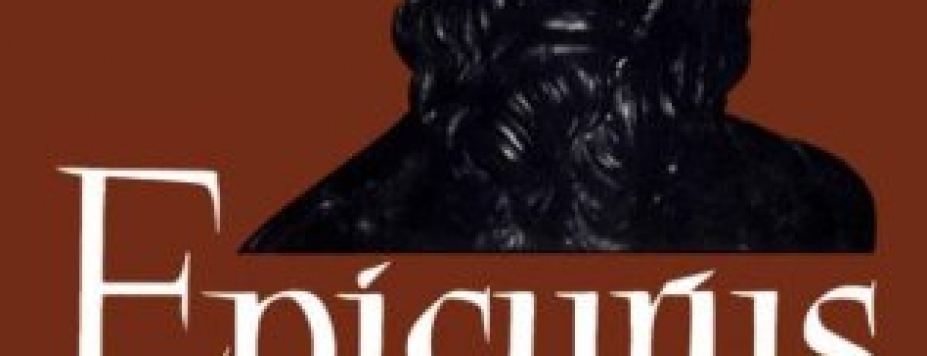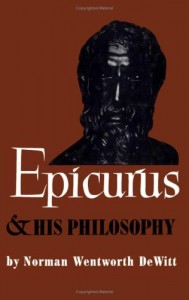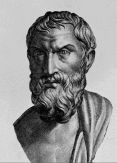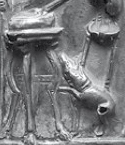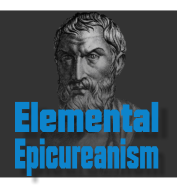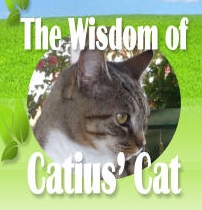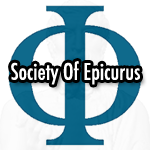CHAPTER VII THE CANON, REASON AND NATURE
THE Canon was not an afterthought, as the Stoics asserted,1 but occupied the first place in the triad of Canon, Physics, and Ethics. This arrangement is unalterable, because the Ethics were deduced from the Physics and the truth of both Physics and Ethics was subject to the test of the Canon, which included Sensations, Anticipations, and Feelings.
The task of expounding the Canon would be much simpler were it not for ancient and modern confusions and ambiguities that beset the topic. Epicurus disposed of it in a single roll. The word canon denotes a rule or straightedge but metaphorically includes all the instruments employed by a builder. A perspicuous account of it is presented by Lucretius, who mentions also the square and the plumb line.2 Apart from this passage, however, Lucretius misleads the reader, because he gives exclusive prominence to the Sensations and seems to have lacked a clear understanding of the workings of Anticipations and Feelings as criteria.
These last two criteria, it is manifest, were not discussed in the Big Epitome which Lucretius had before him. In the graded textbooks of Epicurus the topic must have been reserved for advanced students. It is doubtful whether Lucretius was even acquainted with the roll that treated of the Canon. This is unfortunate, because his own one-sided treatment is largely to blame for the classification of Epicurus as an empiricist and for the ascription to him of belief in “the infallibility of sensation.”
It is an even worse mistake to have confused the tests of truth with the content of truth, that is, the tools of precision with the stones of the wall. This was the blunder of Pierre Gassendi, who revived the study of Epicurus in the seventeenth century. It was his finding “that there is nothing in the intellect which has not been in the senses.” From this position John Locke, in turn, set out as the founder of modern empiricism. Thus a misunderstanding of Epicurus underlies a main trend of modern philosophy. This astonishing fact begets an even greater concern for a correct interpretation, which may cause Locke to appear slightly naive.
The institution of the Canon reflects a contemporary striving for an increase of precision in all the arts, sculpture, architecture, music, and mathematics, but the immediate provocation is to be found in the teachings of Pyrrho the skeptic and of Plato. Pyrrho’s rejection of both reason and the sensations as criteria rendered acute the need of establishing a canon of truth. In the judgment of Epicurus Plato also ranked as a skeptic, because he belittled the sensations as undependable and phenomena as deceptive, the only real and eternal existences being the ideas. Thus in his system reason became the only contact between man and reality, and human reason was crippled by the imprisonment of the soul in the body.
Epicurus denied the existence of Platonic ideas on the ground that the only existences were atoms and empty space. Thus to his thinking man stood face to face with physical reality and his sensations constituted the sole contact with this reality. Had he stopped at this point he would have been an empiricist, but he did not. He made room also for a kind of intuition, which is incompatible with empiricism. He postulated that man was equipped in advance by Nature for living in his prospective environment, and not in his physical environment alone but also in his social environment. In addition to the five senses this equipment included innate ideas, such as that of justice, and these ideas, because they existed in advance of experience, were called Anticipations. Moreover, as Epicurus postulated, each experience of the individual, the sensations included, is accompanied by a secondary reaction of pleasure or pain. These pleasures and pains are the Feelings, which also rank as criteria, being Nature’s Go and Stop signals.
Thus Nature, having equipped man with a triple contact with his environment, becomes a norm, while the Platonic Reason is eliminated along with the Platonic Ideas. It now remains to explain in more detail the dethronement of Reason and the recognition of Nature as the norm.
THE DETHRONEMENT OF REASON
It will have been noted that the Canon makes no mention of reason. This means that reason is denied rank as a criterion of truth. It will be worth while to observe by what procedure this exclusion may be justified and what the consequences will be for the concept of reason itself. The position of Epicurus becomes seemingly paradoxical because there is no instrumentality by which reason can be dethroned except reason itself. Consideration of this paradox may be postponed until it has been shown how the Platonic concept of reason may be rendered absurd. The conclusions will be absolutely logical if the premises are accepted.
As will be set forth in the chapter on Physics, Epicurus adopted and declared Twelve Elementary Principles, one of which reads: “The universe consists of atoms and void.” This is a positive statement. If the implied negative be made explicit, it is this, that there is nothing incorporeal except void. This is destructive of certain teachings of Plato. According to him the sensations inform us only of the things that are transient, that have a beginning and an end. The realities are the eternal forms or ideas, which are not joined up with matter and so are incorporeal. Moreover, according to the same teachings the ideas are apprehensible only by pure reason, which, being, like the ideas, discrete from matter, is itself incorporeal and divine. Logically, therefore, if there is nothing incorporeal except void, the eternal ideas and the divine incorporeal reason are alike absurdities.
By this same principle it should be noted that the incorporeal soul is also eliminated. Thus, the soul, being corporeal and incapable of preexistence or survival, is reduced to a parity with the body. This means farewell to all the disabilities imposed upon it through imprisonment in the body and to all mystical ideas associated with successive incarnations. Corporeal reason alone is left, that is, human intelligence.
There is another of the Twelve Principles that has a specific bearing upon the Platonic concept of reason: “The atoms are always in motion.” If we seek the implied negative of this positive statement — and Epicurus reasons after this fashion — it will be this, that nothing else in the universe is in motion, because the void is incapable of motion and outside of atoms and void there is nothing. It will follow also that no other cause of motion exists. It will be nonsensical, therefore, to think of divine reason as the cause of motion.
There is yet another of the Twelve Principles that possesses a bearing upon the function of reason in the universe. The second Principle reads: “The universe has always been the same as it now is.” 3 This principle is known to us as the law of the indestructibility and uncreatibility of matter. To Epicurus it meant that the idea of primeval chaos was absurd; the universe has always been a cosmos. Specifically, speaking of the various motions of the atoms, he said: “Of these there has been no beginning, the atoms and the void being eternal.” i To him the universe was a cosmos solely because of the various weights, shapes, and magnitudes of the atoms and their motions, all of which were constant factors. Consequently there was no need of the ordering mind (nous) according to Anaxagoras or of the divine demiurge of Plato. Both of these become absurdities. In the extant remains of Epicurus the word nous does not occur; it seems to have been deliberately avoided.
While by this line of argument it will be observed that the incorporeal, eternal, and unerring reason of Plato and Aristotle is eliminated, the purely human, mortal reason remains. Even this is subordinated to the sensations: “Not even reason can refute the sensations, for reason depends wholly upon them.” 8 This does not mean, as Gassendi imagined, that the whole content of thought is derived from the sensations, which was not the teaching of Epicurus, but rather that the deprivation of sensation is virtually death.8 The basic idea is the conviction that reason is incapable of making direct contact with reality; reason is active only when the sensations are active. Without the sensations reason possesses no criteria, since they along with the Anticipations and Feelings function as contacts with reality.
Moreover, it is not in sensation but in human intelligence that error arises. Of sensation he wrote: “Sensation is entirely irrational.” 7 This is not cited as a demerit but as a merit. It is the justification for regarding sensation as a criterion. It cannot “stimulate itself” and, unlike reason, “when stimulated by something external cannot add anything or take anything away.” 8 For example, let us say that the color of white registers itself on the vision. It is not sensation that tells the observer he is seeing a white ox. This is a function of the intelligence and the recognition is “an immediate perception of the intelligence.” 9 Even to such a perception as this Epicurus denied the rank of criterion, though his successors did not,10 and the ground of his rejection is manifest. If the observer says, “It is a white ox,” this is a judgment and as such it is secondary to the sensation itself and it can err. Thus it does not qualify as a criterion. The sensation, however, does not err. As Aristotle said,11 “The sense of sight is not deceived as to color, nor is that of hearing as to sound.”
It remains to mention that Epicurus minimized the value of reason even in dealing with things beyond the range of sensation, whether too minute or too remote for observation. To denote the notions relative to these unseen phenomena he raised a familiar word to the rank of a technical term, epinoiai, which by virtue of the prefix means “secondary” or “accessory” ideas. This is the sense in the following pronouncement: “For all accessory ideas (epinoiai) are derived from the sensations by virtue of coincidence, analogy, similarity and combination, reason also contributing something.” 12 While this grudging concession to reason should be noted, it is observable also that procedures which employ comparison and analogy seem to Epicurus an inferior kind of reason. By analogy, for example, it should seem possible to have a heap of atoms, since we have heaps of dust, but a superior reason intervenes and reminds us that atoms are endowed with motion.13Consequently, a heap of atoms is inconceivable. This superior reason employs the method of inference from the Twelve Elementary Principles. The procedure is deductive; Epicurus is not an empiricist.
Three kinds of reason are thus recognized: first, a dependable kind that proceeds by deduction from first principles; second, an inferior kind that proceeds by analogy from the visible to the invisible and is subject to correction by the former; third, ordinary human intelligence (dianoia), which is normally automatic and hence fallible and is subject to correction by the volitional intelligence.
Common to all these forms of reason is their restriction to the human mind; all are faculties of that mind. Outside of this human mind there is no reason in the universe, no world-mind which expresses itself in eternal ideas, regularities of motion, harmonic relationships, and spherical perfections and is identifiable with truth itself.
It still remains to glance at the paradox in which Epicurus involves himself by employing reason to dethrone reason as the chief criterion. He places himself in a position similar to that of the skeptic who denies the possibility of certainty in knowledge, thus depriving his own skepticism of certainty.
This paradox, moreover, does not stand alone. It is also paradoxical that Epicurus should have omitted reason from his Canon and at the same time accepted a great body of truth accumulated by the reasonings of predecessors and set these down among his Twelve Elementary Principles of Physics. From this inconsistency he thought to escape by treating each of these principles as if a theorem of geometry. For example, to demonstrate that the universe is infinite in respect of both matter and space, he resorts to a disjunctive syllogism.14 If matter were infinite and space finite, the latter could not contain the former. Again, if matter were finite and space infinite, then matter would be lost in space and no clashes or combinations of atoms would occur. Since these alternative assumptions lead to absurdities, the conclusion is that the original proposition is true. With such reasoning even a Stoic logician could find no fault.
This treatment of the Elementary Principles as theorems does not save Epicurus from the charge of inconsistency. It gains for his system of knowledge merely the semblance of being logically self-contained. Reason is employed as a criterion to set up criteria by which it should itself be demoted, if not quite superseded. Reason, however, as he conceives it, is purely human, not divine.
The elimination of the divine reason entails a curious logical consequence: the universe is split in two, the terrestrial and the extraterrestrial regions. The former becomes anthropocentric, since the human Sensations, Anticipations, and Feelings are the norm; the latter is left impersonal and nonpurposive, being governed by natural laws. Plato’s universe, on the contrary, is undivided, being completely theocentric and ruled by the divine and incorporeal reason. In the terrestrial sphere Epicurus approximates to the position of Protagoras, who said “Man is the measure,” while Plato said “God is the measure.”
RIDICULE
It is a tribute to the merit of the Canon that the chief weapon employed against it was ridicule. To have set up a criterion of truth in place of reason, if not impious or sacrilegious, was at least heretical and outrageous. Few concepts are so flattering to the vanity of mankind as the hypothesis that the possession of reason exalts it above the brutes and offers it an affinity with the divine. Mystical notions receive a warmer welcome than cold facts and figures, divine creationism than biological evolution. Plato’s mysticism exercised a subtle flattery all its own, especially by the separation of form and matter, by the assumption of a pure reason contemplating absolute truth, by the identification of reason with God. Part of its charm consisted in a vague self-pity for the soul imprisoned in the body, pondering wistfully on the theme of previous existence and future incarnations. To declare the soul corporeal and to make it the equal partner of the body seemed repulsive realism, more easily satirized than refuted.
The language of Epicurus sometimes swerves toward poetical diction, and in one of his more enthusiastic moments he seems to have been moved by gratitude to blessed Nature to characterize the Canon as diopetes, “fallen from heaven,” as if it were a holy palladium. It was this epithet that Cicero was echoing when he dubbed it “the celestial rule” and more literally in another passage styled it as “fallen from the sky.” ls Plutarch, who employed part of his leisure in digging up old slurs out of the archives, wrote scornfully: “It was not because Colotes had read ‘the heaven-descended Canons’ that bread was perceived by him to be bread and fodder fodder.” 16 Even after the time of Plutarch the Canon seemed good to the frivolous Alciphron for a joke between two courtesans, the Epicurean Leontion and Lamia, mistress of Demetrius the Besieger: “How long will one have to put up with this philosopher? Let him keep to his books on Physics, to his Authorized Doctrines and his cock-eyed Canons.” 1T
NATURE AS THE NORM
In order that the benefit of the synoptic view may be enjoyed at all times, it is well to bear in mind how the vogue of one philosophy waned and that of another waxed. Ionian science reached a peak with Democritus and then suffered a recession in popular interest. It was outshone for the space of three generations by the revolutionary teaching of Socrates and the brilliant teaching and thinking of Plato. Students came from the remotest parts to study in the Academy. The recession from this enthusiasm may escape recognition at this distance of time, but it was nevertheless real. Even the theory of ideas was abandoned by Plato’s immediate successors. Simultaneously the tradition of Ionian science was reviving under the leadership of Aristotle, who was sympathetic with this direction of things by virtue of birth, early training, and cast of mind.
The revived science, however, exhibited a shift of focus. The preceding Ionians had unwittingly confined their studies in the main to inorganic nature. The later Aristotle was a biologist and concerned himself with organic life. It was his particular service to discover a new kind of order in nature, that of the organic structures and processes in living creatures. This new order, in its turn, became a rival of the order of the heavenly bodies, which had been brilliantly exploited by Plato.
The immediate net effect of this was to create a competition between Nature and Reason for the command of philosophic attention. When Aristotle arrived at the conclusion “that Nature does nothing at random,” he was speaking of plant and animal life and was bringing to the fore a new teleology. It is this concept of creative nature that Epicurus took over. He calls the study of nature by the name physiology, the rerum natura of Lucretius, which includes nature in all manifestations, but he denied importance to the study of astronomy and eliminated mathematics from the curriculum of study.
By the word nature Aristotle the biologist meant the creative force in plant and animate life. This is precisely what Lucretius in one passage meant by natura creatrix.1& In practice, however, the scope of the meaning was narrowed by Epicurus to signify “human nature”; this is the meaning undeniably when he wrote: “Nature is not to be coerced.” 19 Only slightly different is the force of the word when he wrote of the beginnings of civilization: “Furthermore it must also be assumed that Nature was taught many and diverse lessons by sheer force of circumstances and compelled to put them into practice.” 20 In this instance Nature signifies the composite and accumulative experience of the human race.
A still different color of meaning is to be discerned in the saying: “Gratitude is due to blessed Nature because she has made the necessities of life easy to procure and what is hard to procure unnecessary.” 21 The gratitude here signified exhibits an advance over the pagan gratitude to Mother Earth as the giver of bread. The wordnature has taken on an ethical connotation. Nature is not merely the creatrix. She seems to be also benevolent and provident. The concept of her is close to that of Aristotle when saying “that Nature does nothing at random.”
PRIORITY OF NATURE OVER REASON
This ascription of benevolence to Nature and the narrowing of the concept to denote human nature or the composite experience of the race all reflects the pronounced ethical bias of Epicurus. Along with this bias goes a deliberate plan to exalt Nature over reason. In point of time and succession Nature is made to possess precedence.
His most telling argument has been preserved by Cicero.22 Let it be assumed that a human being has been deprived of all his five senses. This is tantamount to death and the subject has ceased to be a rational creature. In a muddled paragraph our biographer Laertius ascribes to Epicurus the idea “that the Sensations lead the way.”23 In the present context this notion seems to have apposite application: the possession of sensation seems to be construed as antecedent to rational activity.
The priority of Nature was also insisted upon in establishing the identity of the end or telos. Aristotle had furnished a precious hint in this connection; he wrote “that perhaps even in the case of the lower animals there is some natural good superior to their scale of intelligence which aims at the corresponding good.” 24 To this principle Epicurus adapted his procedure. By the promptings of Nature alone, apart from reason, every animate thing, the moment it is born, reaches out for pleasure and shrinks from pain. Consistent with this reasoning is the steady practice of referring to pleasure as “the end of Nature,” which occurs five times in our scant remains. As analogous phrases may be cited “the good of Nature” and “the pleasure of Nature,” all of them implying that reason played no necessary role in establishing the truth. Similar is the implication of parallel phrases such as “the wealth of Nature,” signifying that Nature and not reason reveals the true meaning of wealth; and also “the limits of Nature,” implying that Nature and not reason teaches the true limits of the desires.25
Another aspect of this priority of Nature over reason is manifest in the beginnings of human institutions. Since the sole cause of growth and change in the universe is the ceaseless motion of the atoms and this activity is nonpurposive, it follows that actions invariably precede thought. On this point the judgment of Epicurus is explicit: “Moreover, it must be assumed also that human nature by sheer force of circumstances was taught a multitude of lessons of all sorts and compelled to put them into practice, though reason subsequently contributed refinements and additions to these recommendations of hers, in some fields more rapidly, in others more slowly.” 26 Lucretius in his fifth book enlarged liberally upon this theme: human beings wore skins before they manufactured garments; they lived in caves before they built huts; they employed clubs before they made weapons; they lived dispersed before they organized governments and built cities.27
The illustrative examples just cited were probably drawn by Lucretius from the Big Epitome of Epicurus. Special interest attaches to the topic of the origin of language, because this was the only example chosen by Epicurus in his extant Little Epitome for the enlightenment of beginners. There was a controversy in his day whether language had its origin in invention and enactment or in natural evolution. The former theory assumed that some god or some gifted individual invented the names of things and prescribed them for the multitude. This notion was scouted by Epicurus. The following quotation, though hardly a verbatim report, expressed his judgment: “These men did not assign names to things intelligently but stimulated by a natural instinct, just as men cough or sneeze, cattle bellow, dogs bark and suffering men moan.” 28 Subsequently, the talented few, according to his account, taking their cues from Nature and impelled by expediency, by slow degrees brought human speech to its perfection among various races in various environments.29
The specific logical ground upon which Epicurus based this view of the origin of language was the postulate that action is bound to precede thought. The involuntary act is the indispensable stimulus to the voluntary effort through which refinement and improvement are achieved. Let Lucretius speak for Epicurus: “Besides, if other men too had not employed spoken words in their intercourse one with another, from what quarter was this notion of utility implanted in this man’s mind and from what source was this capacity in the first instance bestowed upon him, so that he knew and envisaged in his mind what he wished to do?” 30 From this disability not even the gods were believed to be exempt. Unless Nature had first presented a specimen of creative activity, Lucretius demanded to know,31 how could the gods have known how to plan or create a world?
Since Nature is assumed to be the sole creatrix and man is restricted to improving upon her suggestions, it follows that Nature is the supreme teacher. By the same reasoning Physics is the supreme science, because through the study of this the teachings of Nature come to knowledge. As Cicero correctly informs us, “Through this body of knowledge the force of words, the meaning of style and the distinction between the logically consistent and the logically inconsistent can be discerned.” 32
In this quotation three topics are broached, words, style, and logic. The first two may be discussed together. By implication it seems to be declared that Nature is neither a poet nor a rhetorician nor a dialectician. Words must be taken at their face value, just as Epicurus advises the young Herodotus.33 This means for one thing that the use of figures of speech is abjured. Although the wise man may become a good critic of poetry, he will not compose poems.34 Consistent with this is the information that the writing of Epicurus was characterized by propriety,35 which means the avoidance of figures of speech. The critic Aristophanes is said to have censured it as “highly peculiar.” 36 In this attitude toward style Epicurus was certainly influenced by the contemporary vogue of geometry, which instituted a way of writing unprecedented for its baldness, yet undeniably adapted to its needs. His declaration that the sole requisite was clearness,37 was no more applicable to himself than to geometers.
This exaltation of clearness and the rejection of figurative language is consistent with another dictum of Epicurus: “The wise man will leave writings behind him but he will not compose panegyrics.” 38 It was in composing such speeches for festive occasions that the rhetoricians really gave themselves free reign and swung over to the diction of poetry.
The same priority of Nature over reason that predetermined the right kind of writing and rendered rhetoric superfluous eliminated dialectic, but the logic of this judgment can be given more precision. The effect of the doctrine that nothing exists except atoms and void was to deny the reality of Plato’s eternal ideas. Thus dialectic, which was the avenue to comprehension of those ideas, became a superfluity. The testimony of Laertius is explicit: “Dialectic they reject as superfluous, for it should suffice physicists to get along with the names of things as they find them.” M While this advice seems to overlap the recommendation concerning style, the application is different. It means that the quest of definitions is useless. This quest is capable of terminating in fantastic concepts, such as Other, Same, and Essence in Plato’s Timaeus, possessing no meaning unless on the highest level of abstraction. Since Epicurus rejected the reality of the eternal ideas, such terms could possess no meaning at all. Hence the following dictum: “There are two kinds of inquiry, the one about realities, the other ending up in sound without sense.” *° In the same vein is the advice to the young Herodotus to take words at their face values “so as not by our endless attempts to define have all our ideas in confusion or have mere vocables that mean nothing.” 41
As a parting comment it may be stated that, when once Nature has been established as the norm, it follows logically that man should live according to Nature, but the Epicureans seem never to have followed this inference through. It remained for the Stoics to identify Nature with Reason and to make a fetish of living according to Nature. They believed her supreme teaching was to be found in the divine order of the celestial realm, where Nature and Reason were at one.




